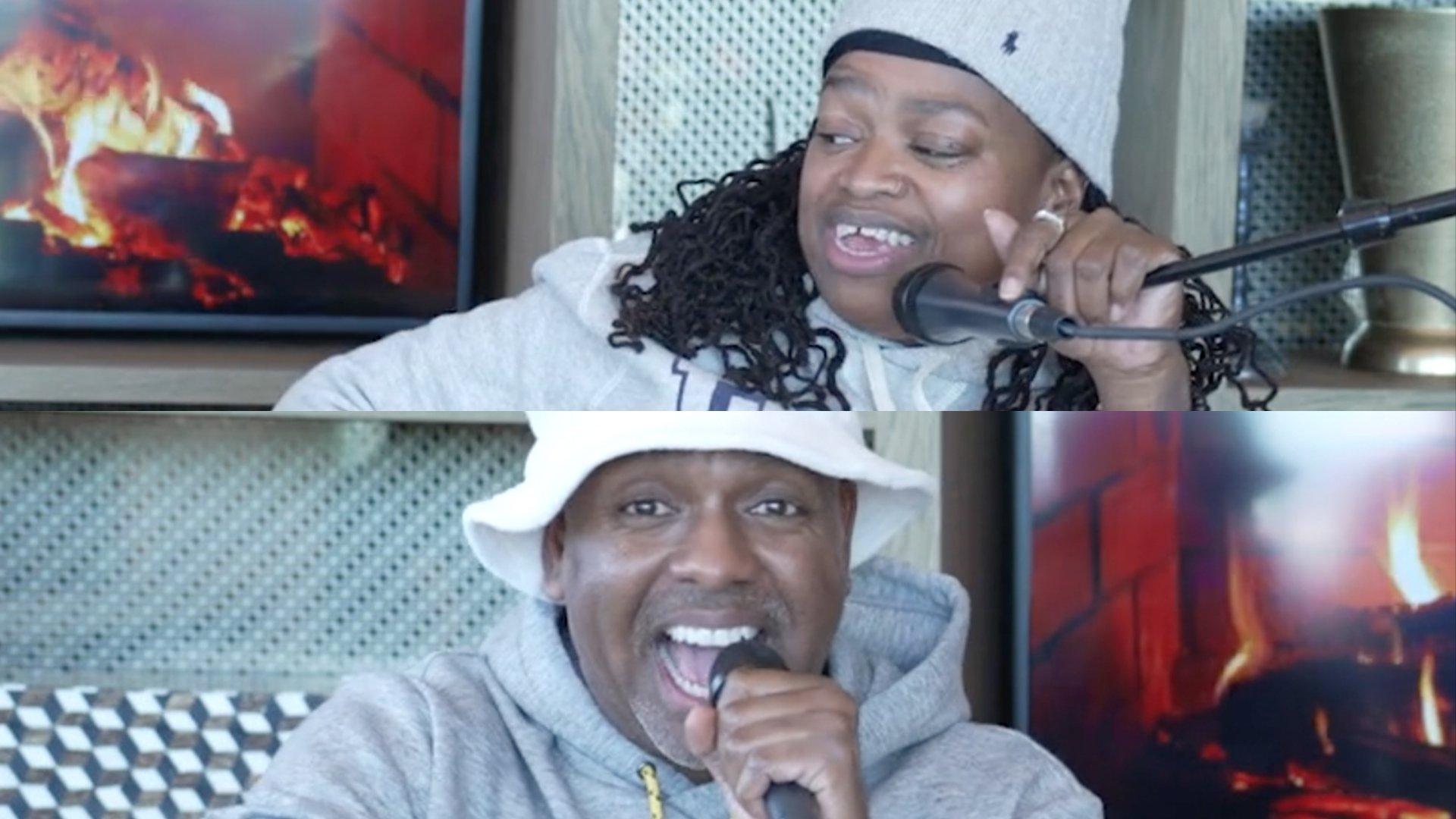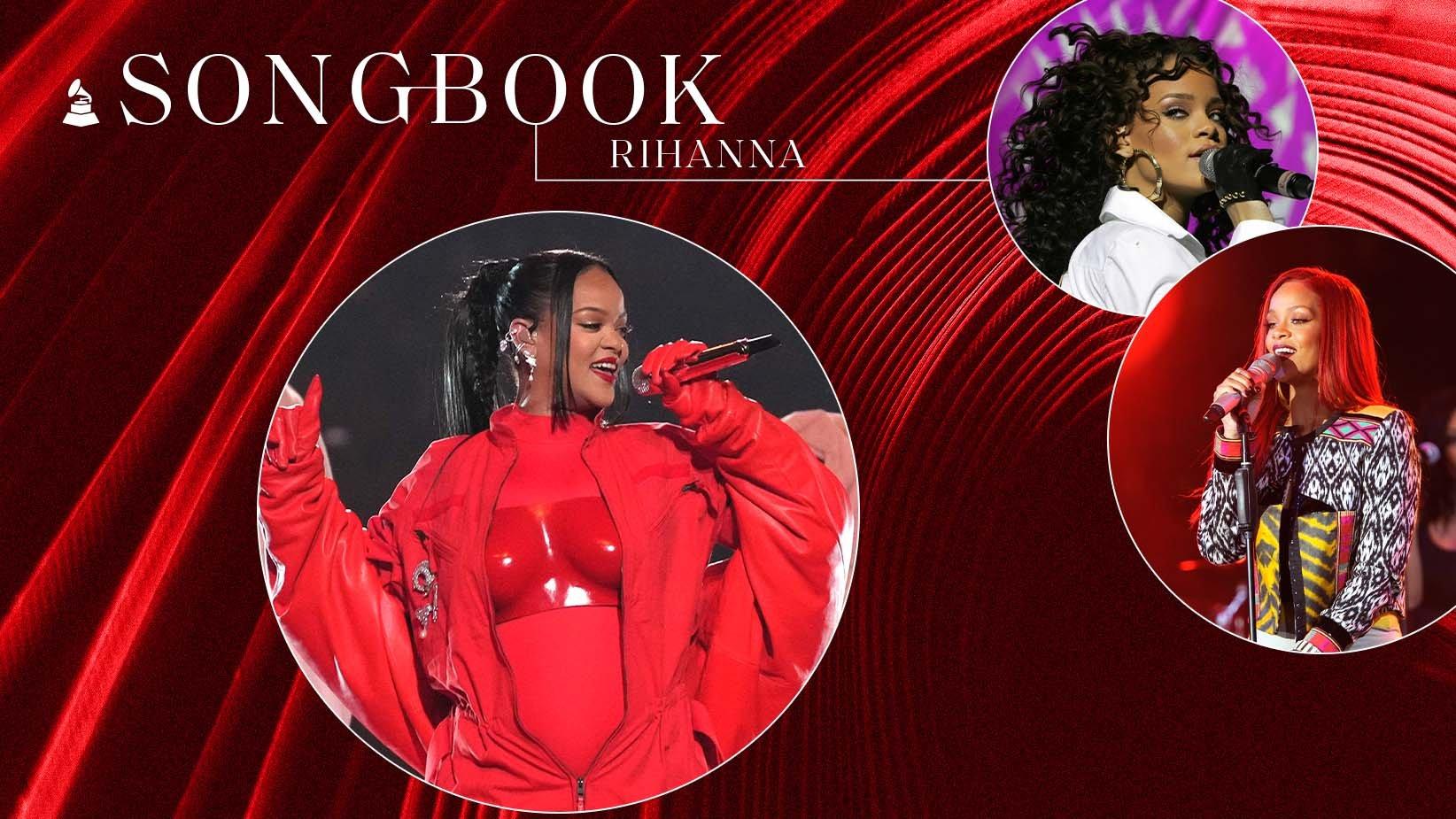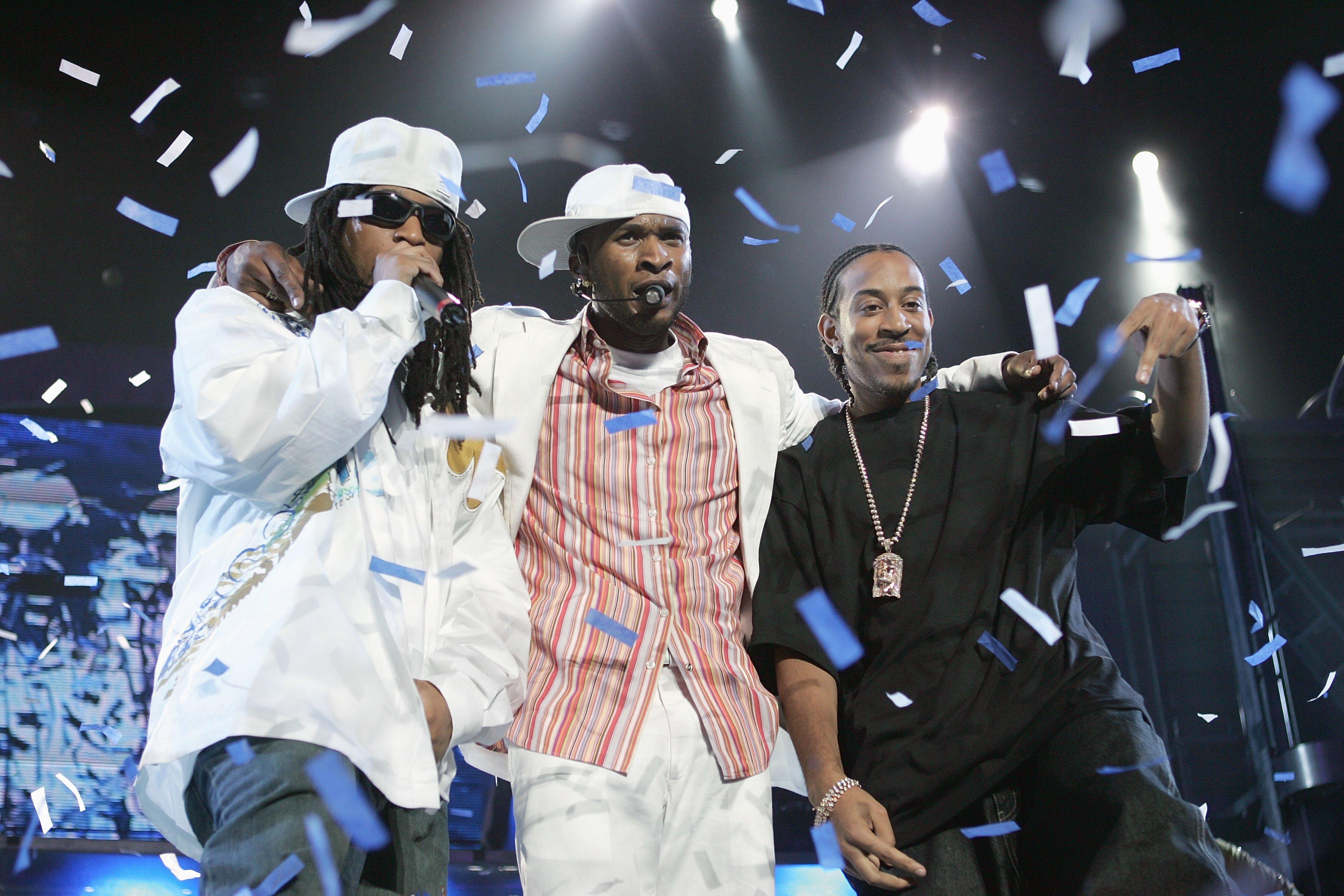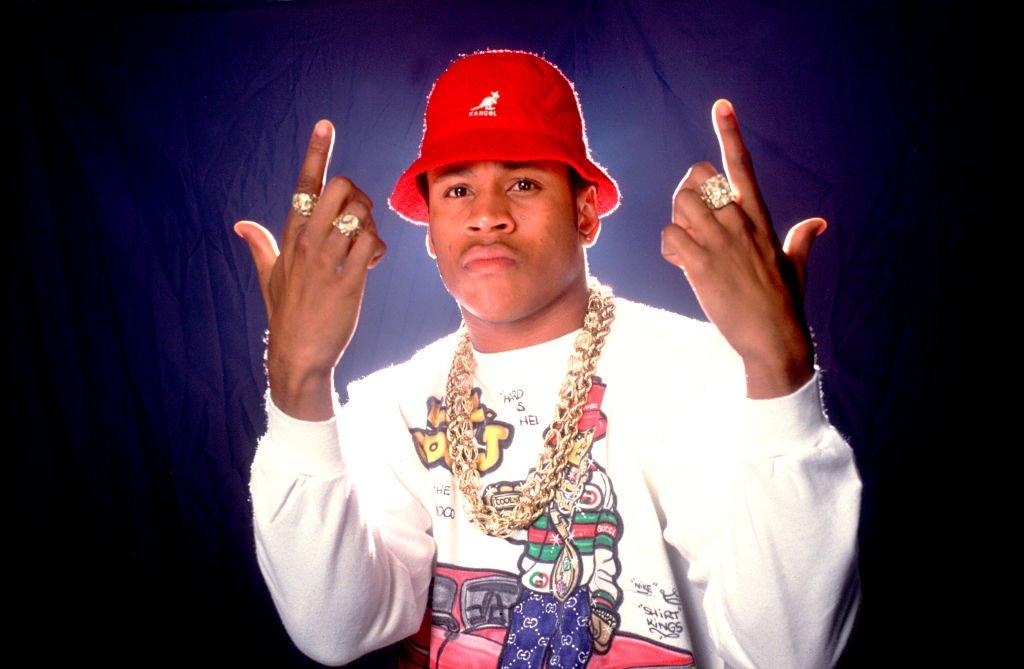A chance meeting changed Rihanna's life.
The singer was just 15 years old when she met producer Evan Rogers, who was vacationing with his wife in Barbados. Rogers recognized Rihanna's potential, and invited her to an audition in his hotel suite.
Shortly after her 16th birthday, Rihanna left her home country for the U.S. to record a demo, which included her breakthrough hit "Pon de Replay." The demo found its way into Jay-Z's hands, and Hov signed the teen artist to Def Jam and the label expedited her 2005 debut album, aptly titled Music of the Sun.
"When I left Barbados, I didn't look back," Rihanna told Entertainment Weekly in 2007. "I wanted to do what I had to do [to succeed], even if it meant moving to America."
Twenty years later, Rihanna is a renowned entertainer-turned-mogul. She has sold over 40 million albums worldwide, garnered over 12 billion Spotify streams, achieved 14 Billboard Hot 100 chart-toppers, and won nine GRAMMY Awards. Even her business ventures have been a massive success, as her Fenty Beauty brand is worth $2.8 billion.
Though it's been close to a decade since Rihanna's last studio album, 2016's ANTI, she reminded the world of her reign with her 2023 Super Bowl halftime show — which also marked her first time taking the stage in five years. Performing hit after hit while unveiling a baby bump, her 13-minute set became one of the most-watched halftime shows of all time with over 121 million viewers.
In honor of Rihanna's 36th birthday on Feb. 20, GRAMMY.com is revisiting the monstrous hits, ambitious projects, brow-raising visuals, and iconic collabs that propelled her to international stardom — and why it's all put her in a league of her own.
A New Island Girl In Town
True to her Carribean heritage, Rihanna's dancehall-inspired debut single "Pon de Replay" earned the then 17-year-old Barbados native her first entry on the Hot 100 at an impressive No. 2. Her official introduction to the world also hit No. 1 on the Billboard Dance Club Songs chart; she boasts 33 on the tally, second behind only the Queen of Pop herself, Madonna.
Follow-up single "If It's Lovin' That You Want" stalled at No. 36 on the Hot 100, but still whetted fans' appetite — as did her debut album, Music of the Sun, which is mostly comprised of dance-pop and dancehall tracks with hints of R&B (like "Willing to Wait"). Plus, her reimagining of Dawn Penn's 1994 reggae classic "You Don't Love Me (No, No, No)" is still so fun to listen to after all these years.
A mere eight months later, Rihanna's sophomore effort, 2006's A Girl Like Me, arrived to an eager audience. Defying the sophomore slump, she celebrated her first No. 1 with the ubiquitous lead single "SOS," which famously samples Soft Cell's 1981 hit, "Tainted Love." While A Girl Like Me is filled with high-energy, danceable tracks (including the nostalgic "Break It Off" with Sean Paul), Rihanna's second single was the melodramatic ballad "Unfaithful."
Penned by then-labelmate Ne-Yo, "Unfaithful" peaked at No. 6 on the Hot 100. More importantly, it showed a different side to Rihanna, proving that she could channel deep emotion when the performance calls for it. It also marked Rihanna's first time veering away from her "girl next door" image, as the song's subject matter deals with infidelity.
A Girl Like Me contains many fan favorites, from the laid-back "We Ride" to standouts "Dem Haters" and "Kisses Don't Lie." The latter is a reggae-rock hybrid that sounds like a catalyst for some of Rihanna's edgier tunes like "Breakin' Dishes" from 2007's Good Girl Gone Bad era. Touching ballads"Final Goodbye" and "A Million Miles Away" showcase her voice beautifully, foreshadowing later big-vocal numbers like "Love on the Brain."
An Icon In The Making
Rihanna was a familiar face by 2007, but with the arrival of her third studio album, Good Girl Gone Bad, she graduated from cookie-cutter pop star to bonafide icon.
Produced by Tricky Stewart, the LP's juggernaut lead single "Umbrella" featuring Jay-Z skyrocketed to No. 1 in 17 countries. Between striking images of Rihanna's silver-painted silhouette in the accompanying video and the now-iconic "ella-ella, eh, eh, eh" hook, "Umbrella" thrust the then 19-year-old into another stratosphere. Her confident delivery also commanded attention in a way fans and critics hadn't heard before.
The transformative era also birthed the gritty "Shut Up and Drive," on which Rihanna channels her inner rock star. The next two singles cracked the top 10: an affectionate duet with Ne-Yo, "Hate That I Love You," which showed off Rihanna's softer side, and the party-starting, Michael Jackson-sampling "Don't Stop the Music," which cemented her place in the digital era.
The melancholy "Rehab" is a clever metaphor for lost love, co-written by Timbaland and Justin Timberlake. Despite being Good Girl Gone Bad's lowest-charting single, Timberlake heralded the song as "the bridge for her to be accepted as an adult in the music industry."
Good Girl Gone Bad remains Rihanna's best-selling album and marks her greatest reinvention as she adopted a more rebellious sound. She also won her first GRAMMY in 2008 (Best Rap/Sung Collaboration for "Umbrella") and scored four other nominations, including Record Of The Year. The album's reissue spawned two more No. 1s: "Take a Bow" and "Disturbia," the latter of which acts like a prelude to Rated R, which saw Rihanna exploring darker themes.
Nine months before the release of 2009's Rated R, Rihanna was assaulted by then-boyfriend Chris Brown. On the deeply personal album, she translated her pain into art. Through lead single "Russian Roulette" and bitingly catchy anthems "Stupid in Love," "Fire Bomb," "Photographs," "Cold Case Love," and "The Last Song," Rihanna explored her angst and confusion.
But to focus solely on the domestic violence incident undermines Rihanna's artistic vision.
Following three multi-platinum albums in a three-year span, Rihanna's rebranding as a rebel at heart reached its apex. The singer had grown in leaps and bounds while taking musical risks, even penning nine of Rated R's 13 tracks (she had no writing credits on Good Girl Gone Bad).
The road to Rihanna's most badass anthems — including "Bitch Better Have My Money" — can be traced back to Rated R. Case in point: Her bravado is loud and clear on "Hard," "Wait Your Turn," and "G4L." On "Rockstar 101," which features legendary rocker Slash, Rihanna declares her power: "Six inch walker/ Big sh— talker/ I never play the victim/ I'd rather be a stalker."
Badgal RiRi returned to her dancehall roots on her fifth No. 1 "Rude Boy," which offsets the album's harrowing motif. Final single "Te Amo" didn't chart, but garnered a great deal of attention as the Latin-infused Stargate production depicts Rihanna being enticed by a female love interest.
Rated R showcased Rihanna's undeniable star power, and allowed her to shed her good-girl image once and for all.
A Partygoer's Dream
Following the career-pivoting Rated R, 2010's Loud offered a welcome return to the West Indian artist's earlier sound. The album feels like one big celebration of life, as evidenced by Rihanna's fire-engine red hair and No. 1 singles "Only Girl (In the World)" and "What's My Name?" (the latter of which was Rih's first collaboration with Drake).
Best described as "Don't Stop the Music" 2.0, the effervescent "Only Girl" marked her eminent return to the dance floor and took home a GRAMMY for Best Dance Recording in 2011. While "What's My Name?" may not outshine Rih and Drizzy's other collabs — including 2011's "Take Care" or 2016's "Work" — the second she sings, "Hey, boy, I really wanna see if you can go downtown with a girl like me," it's impossible not to whine your waist to the riddim.
Easily one of Rihanna's most overlooked hits, "Cheers (Drink to That)" is built around an unexpected sample of Avril Lavigne's 2002 hit "I'm With You," but it works surprisingly well as a party anthem. That same carefree spirit can be heard in the feminist track "Raining Men," which features Nicki Minaj — their first of two collabs, as they joined forces again for "Fly," the final single off the rapper's iconic Pink Friday album.
A playful ode to sadomasochism and bondage, "S&M" contains some of Rihanna's most provocative lyrics: "Sticks and stones may break my bones/ But chains and whips excite me," she declares on the chorus.
Banned in 11 countries upon its release, the accompanying video features Rihanna tied up in pink rope, dancing with a blowup doll, and donning a Playboy bunny-esque costume as damning newsreels about herself flash across the screen. But Rihanna's love of kink made her an even bigger star: "S&M" produced a remix with Britney Spears and earned Rihanna her 10th No. 1 single. With this feat, she became the youngest artist to attain the most chart-toppers in a five-year span.
On "Man Down," Rihanna's patois is in full effect as she takes listeners through a gripping tale about murdering her abuser. "What started out as a simple altercation/ Turned into a real sticky situation," she laments in the opening verse, amplified by siren noises in the background. There's something so satisfying about Rihanna's Bajan accent as she unfurls "Rum-pum-pum-pum" repeatedly over an intensifying reggae beat that would make Sister Nancy and Bob Marley proud.
Nominated for Album Of The Year at the 2021 GRAMMYs, Loud is Rihanna's second most commercially successful LP — and for good reason. It was especially refreshing to see Rihanna emerge from one of the darkest periods of her life as exuberant as ever.
An Unapologetic Queen
Sonically and thematically, Talk That Talk doesn't break new ground, but Rih's DGAF attitude is front and center with plenty of sexual innuendos: Songs like "S&M" and "Rude Boy" seem pretty tame next to "Cockiness (Love It)," which features longtime friend-turned-boyfriend A$AP Rocky on its remix. "Suck my cockiness/ Lick my persuasion/ Eat my poison/ And swallow your pride down, down," she commands in the tantalizing chorus.
At just over a minute long, "Birthday Cake" leaves nothing to the imagination ("It's not even my birthday, but he wanna lick the icing off"). Rihanna controversially released a full-length version in the form of a remix with Chris Brown.
On an album that mostly sees Rihanna singing about her sexual fantasies, "We All Want Love" pulls back the curtain as it reveals her desire for true love: "And some say love ain't worth the buck/ But I'll give my last dime/ To have what I've only been dreaming about."
Her longing continues in "Where Have You Been," which flaunts Rihanna's versatility, flipping Geoff Mack's 1959 country song "I've Been Everywhere" into an infectious EDM banger. Lead single "We Found Love" is undeniably the biggest hit to stem from the Talk That Talk era, spending 10 consecutive weeks atop the Hot 100.
Boosting Calvin Harris' career, "We Found Love" presents one juxtaposition after the other: dark yet gleaming, euphoric yet sobering, fraught yet hopeful. Rihanna relies on more than just evocative lyrics to tell her story; accompanying synthesizers and alarm bells help to paint a picture as well. Met with controversy, its intense visuals portraying a drug-fueled, toxic relationship — and featuringwhat many speculated was a Chris Brown look-alike — earned RiRi a GRAMMY for Best Long Form Music Video in 2013.
Seven years into an already extraordinary career, 2012's Unapologetic became Rihanna's first album to debut at No. 1 on the all-genre Billboard 200 chart. Its lead single "Diamonds" resonated in an equally major way, giving Rih her 12th No. 1 on the Hot 100.
Written by Sia, the power ballad kicked off another exciting era for the Barbadian singer, who unleashes an impassioned vocal performance. One of Rihanna's most precious offerings to date, "Diamonds" emerged as a self-love mantra due to its uplifting "Shine bright like a diamond" chant.
Vocally, Rihanna's strength lies in her ability to evoke raw emotion à la "Stay." Featuring Mikky Ekko, the stripped-down, slow-burning piano ballad narrowly missed the top spot on the Hot 100 but gave Rihanna her 24th top 10 hit, surpassing Whitney Houston's record of 23 in 2013.
Her swagger is boisterous in "Phresh Out the Runway," "Jump," and strip club anthem "Pour It Up," but "Nobody's Business" really drives home the album's theme of being unbothered. Her decision to join forces with Chris Brown yet again perplexed fans and critics alike, though the track itself is an irresistible production that features a genius interpolation of Michael Jackson's "The Way You Make Me Feel."
Further down the track list, "Love Without Tragedy / Mother Mary" is as autobiographical as it gets, and further taps into Rihanna's emotionally vulnerable side. "Mr. Jesus, I'd love to be a queen/ But I'm from the left side of an island/ Never thought this many people would even know my name," she pleads in the seven-minute two-parter.
Unapologetic spawned fewer hit singles compared to Rihanna's previous efforts. Its win for Best Urban Contemporary Album at the 2014 GRAMMYs, however, proved that Rihanna's reign wasn't letting up anytime soon.
While recording her then-forthcoming album, ANTI, Rihanna delivered what is arguably the single most unapologetic moment of her career: "Bitch Better Have My Money." The backstory is almost inconceivable given Rihanna's awe-inspiring billionaire status, but in 2009, Rihanna faced bankruptcy due to her accountants mishandling her funds — and thus "Bitch" was born six years later in 2015.
With lyrics like "Your wife in the backseat of my brand new foreign car" over a cryptic-sounding trap beat and an accompanying video depicting kidnapping and torturing her debtors, "Bitch" is not for the faint-hearted. The one-off single is so quintessentially Rihanna that it notably kicked off her Super Bowl halftime show.
An In-Demand Collaborator
While bestowing hit after hit on her own, Rihanna generously lent her distinct voice to some of her biggest peers. 2008 marks one of the earliest instances of her Midas touch: She flirts with funk in Maroon 5's underappreciated "If I Never See Your Face Again" before hopping on T.I.'s "Live Your Life," which shot straight to No. 1 on the Hot 100.
In 2009, Rihanna joined Jay-Z and Kanye West for the militant "Run This Town," sounding defiant as ever in the intro. She was called upon again for West's horn-laden "All of the Lights," flying solo on the hook followed by a star-studded choir that included Alicia Keys, John Legend, Fergie, and Elton John. Both larger-than-life productions won GRAMMYs for Best Rap/Sung Collaboration in 2010 and 2012, respectively.
In between joining forces with Hov and Ye, Rihanna assisted Eminem in "Love the Way You Lie," which struck a nerve with many for its gut-wrenching lyrics shedding a light on abusive relationships. (Rih recorded an equally moving sequel for her Loud album.) Three years later, the two confronted their inner demons in "The Monster," and their musical chemistry scored a GRAMMY in 2015 for Best Rap/Sung Collaboration.
Amid smash collabs, Rihanna and Coldplay's intricate "Princess of China" number gets lost in the shuffle, but it speaks to her charm as it's the band's first album (2011's Mylo Xyloto) to feature another artist. Another overlooked jam, her sultry "Can't Remember to Forget You" duet with Shakira sees both stars trade lines about struggling to let go of an undeserving lover.
On paper, a collaboration between Rihanna, Kanye West, and Sir Paul McCartney may seem strange, but the unlikely trio is further proof that opposites attract. Their "FourFiveSeconds" is a pop-folk hybrid with a universal message about carrying the weight of the world on your shoulders. It's yet another example of Rihanna's willingness to push past her comfort zone to create something unique.
A year later, Rihanna got listeners on their feet by way of the Taylor Swift-penned "This Is What You Came For" with Calvin Harris. Understated compared to the duo's previous megahits ("We Found Love" and "Where Have You Been"), Harris' signature DJing style and Rih's ethereal vocals are a perfect match.
In 2017, Rih, DJ Khaled and Bryson Tiller dropped the song of the summer with "Wild Thoughts," which heavily borrows from Carlos Santana's 1999 GRAMMY-winning "Maria Maria." It may be DJ Khaled's song, but RiRi owns it from the very moment she utters, "I don't know if you could take it/ Know you wanna see me nakey, nakey, naked." The bop reached No. 2 on the Hot 100.
She spits bars in Kendrick Lamar's "Loyalty" and "Lemon" with N.E.R.D., the latter of which comes close to rivaling your favorite rappers' verses: "You can catch me, Rih, in the new La Ferrar'/ And the truck behind me got arms/ Yeah, longer than LeBron/ Just waitin' for my thumb like The Fonz."
No matter what genre Rihanna touches or what artist she links up with, she brings her full self to each session whilst completely immersing herself into the music — taking on different personas to make the collab well worth it.
An Artist Fully Realized
With 13 No. 1s and twice as many top 10 hits under her belt, Rihanna set out to create timeless music instead of chasing a radio-friendly formula with her 2016 magnum opus, ANTI.
But that shift began with 2015's criminally underrated "American Oxygen." Her most political statement at the time, the goosebump-inducing lyrics detail Rihanna's journey as an immigrant, foreshadowing her then soon-to-be massive Fenty Beauty success. "We sweat for a nickel and a dime/ Turn it into an empire," she sings in the chorus.
Released four years after Unapologetic — her longest gap between albums at the time — ANTI illustrated Rihanna's greater desire for quality over quantity. "I needed the music to match my growth," she told Vogue in 2016 about the making of ANTI. "I didn't want to get caught up with anything the world liked, anything the radio liked, anything that I liked, that I've already heard. I just wanted it to be me."
The black-and-white, red paint-splattered album cover signals a rebirth, featuring a real-life image of Rihanna as a child. ANTI lives up to its name in its first 40 seconds, via opening track "Consideration." The minute she declares, "I got to do things my own way, darling," it's apparent that ANTI is not your average Rihanna album.
Lead single "Work" is the closest to pre-ANTI Rihanna on an album that defies expectations. But the dancehall masterpiece is one of a kind for Rih's refusal to water down the Jamaican patois (different from her native language of Bajan Creole) — proving that she is fully aware of her impact as one of the biggest Caribbean-born artists to make it in the U.S.
Many non-understanding listeners described it as "gibberish" at the time. Yet, the general public didn't seem to mind: About a month after its release, "Work" became Rihanna's 14th and longest-running chart-topper on the Hot 100. Weeks later, ANTI became her second LP to top the Billboard 200 chart. Subsequently, Rihanna held the No. 1 spots on the Billboard 200 and Hot 100 simultaneously, her second time achieving such an impressive feat.
Read More: How Rihanna's "Work" Reinvigorated Dancehall
ANTI is full of pleasant surprises that show off her artistry. Rihanna comes out of left field with the Prince-inspired "Kiss It Better," the album's second single, which sees the superstar falling back on addictive sex that "feels like crack" to justify a destructive relationship. "Same Ol' Mistakes" is a cover of psychedelic rock band Tame Impala's "New Person, Same Old Mistakes" — her first time remaking another artist's song for her own album since "You Don't Love Me (No, No, No)" on Music of the Sun. The Western-themed "Desperado" lends itself particularly well to covers by country artists, while the Dido-sampling "Never Ending" conveys the uncertainty she feels about entering a new relationship.
Elsewhere on ANTI, Rihanna drunk dials an ex ("Higher"), compares smoking weed to her lover ("James Joint"), and chastises a guy for getting emotionally attached after their fling ("Needed Me"). The latter song contains one of Rihanna's most empowering lyrics: "Didn't they tell you that I was a savage?/ F— ya white horse and ya carriage," she asserts in the pre-chorus.
Her voice sounds stronger than ever on "Love on the Brain," a doo-wop ballad resembling Etta James. But Rihanna makes it her own thanks to the bluntness of lines like "It beats me black and blue but it f— me so good."
The deep cuts on ANTI aren't merely fillers, and even rival some of the album's biggest hits. For instance, "Sex with Me" is featured on the deluxe edition as a bonus track, but managed to crack the Hot 100 at No. 83 and reach No. 8 on the R&B/Hip-Hop Airplay chart. Furthermore, the deluxe edition consists of 16 tracks, half of which topped the Dance Club Songs chart — smashing the record (previously held by Katy Perry's Teenage Dream) for the most No. 1s from a single album.
Accolades aside, ANTI is proof that magic happens when an artist of Rihanna's caliber follows their own instincts in pursuit of creating a body of work — one that can outlast them and continue to inspire generations to come.
Ever since ANTI, Rihanna's devoted fanbase has been begging for a new album, with Rih playfully trolling them with responses like "I lost it" and Instagram captions that read, "Me listening to R9 by myself and refusing to release it."
Her much-awaited return to music came at the tail end of 2022. The hitmaker twice contributed to the GRAMMY-nominated Black Panther: Wakanda Forever soundtrack: "Born Again" and "Lift Me Up," the latter of which helped Rihanna score her first Oscar and Golden Globe nominations in 2022 and 2023, respectively. With the glorious "Lift Me Up," she found herself in the top 10 for the first time since 2017's "Wild Thoughts."
While the world is still anticipating her ninth studio album, Rihanna — now a mom of two boys — continues to make her own rules and move at her own pace. But as she's proven time and time again, it's always worth the wait.
The Rihanna Essentials: 15 Singles To Celebrate The Singer's Endless Pop Reign





